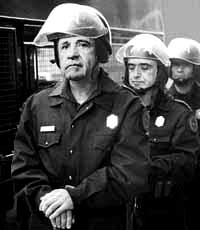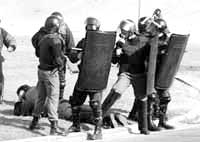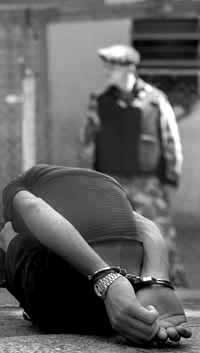|
 Argentina: Heavy Trading in Insecurities
Argentina: Heavy Trading in Insecurities
"You are afraid of god and the devil, of the priest and
the neighbour, of your employer and boss, of the politician
and policeman, of the judge and the jailer, of the law and the
government. All your life is a long chain of fears ..."
- Alexander Berkman (from What is Anarchist Communism?
1929)
"Without the use of violence there would be no state"
- Max Weber (Essays in Sociology, OUP, 1958)

These are violent times in which we live. And they're getting
worse. Is that true, or is it just a perception? Whatever it
is, it is not unique to this country or to this continent. On
the contrary, the perception is stronger where capital's need
to create and sustain it is greater: in the "emerging"
countries of the world, where real hunger in the stomach risks
undermining the manifold joys of capitalism's new virtual circus.
One such country is Argentina. The new Alianza government of
De la Rúa is 'virtually' indistinguishable from the previous
one of Menem, humbly obeying the dictates of the IMF and the
foreign multinationals as did its predecessor. Following the
standard formulas of the SAPs to the letter, they are raising
taxes to pay off the debt while cutting jobs, slashing pensions,
selling off everything but the very air, causing desperation.
The gap between rich and poor is growing at an alarming rate,
and people are afraid; as they were back at the time of the
electoral campaign last year, when De la Rúa was depicted
in one of his TV ads striding confidently towards the future,
surrounded by a mysterious gang of leather-clad machine-gun-toting
henchmen. He was gonna clean up this country! Politicians need
to be macho in Latin America today, as Chavez in his army fatigues
and Fujimori the hostage-taker-killer will testify.
For his part, Menem, when president, launched two major offensives
on the 'tough on crime" theme. First he accused immigrants
(now what civilized politician here would ever do that?) and
then a "wave of violence" of mysterious origin that
enabled him to affirm that crime is only eliminated by applying
"zero tolerance" and giving more powers to the police.
As Giuliani and Straw will testify, there's nothing new in the
world of modern policing.
Now De la Rúa is 'safely' installed, the honeymoon period
is over, and fear eats the soul once more as before. The fear
is of being a victim of crime. Official statistics differ as
to the extent of the problem: According to the Ministry of the
Interior, in 1998 - the most recent year for which records are
available - 960,000 crimes were recorded (1 per minute) in Buenos
Aires and its suburbs. The government of Buenos Aires gives
the figure as 138,200 (1 every 4 minutes). For the Federal Police
- answerable to the Ministry of the Interior - the number of
crimes for that year was 199,148 (1 every 2.5 minutes). They
can't agree how much crime is being committed, but they don't
deny it's a lot.
For Marcelo Ciafardini, director of Crime Policy during Menem's
government, however, "the general sensation of insecurity
is always higher than the actual crime rate. What happens to
others has a rebound effect, and the point is reached where
90% of the population are afraid of being attacked, though this
doesn't mean that they actually will be".

Despite their undoubted knowledge of repressive techniques,
the police seem to be far less effective at getting their person.
As Ciafardini himself says, "there has been an increase
in crime against property and the police only find those responsible
in 5% of cases". Strangely, opinion polls also show that
between 68% and 73% of the population fear those in uniform.
What can they have done to deserve that?
The result of all this has been the privatization of security.
There are 1,286 surveillance companies in Argentina, almost
all run by former soldiers and police chiefs who served the
last dictatorship; between them they have an army of 90,100
men, all armed, and last year they had a turnover of US$986
million. Muscles and guns are closely followed by CCTVs; there
are 63 companies solely devoted to electronic and satellite
surveillance.
Of course, the wealthiest sectors of the population, those with
most reason to fear popular discontent, have the luxury of being
able to hide away from it in their enclaves: closed-off neighbourhoods
with high perimeter fences, CCTVs and armed private security
guards. In total, there are 412 of these enclaves in the suburbs
of Buenos Aires, with a further 87 under construction, and in
the capital itself there are 68.
All this is out of the range of the less wealthy, but they can
content themselves with all manner of off-the-shelf serenity-inducing
goods on offer from the security industry: alarm systems at
a cost of $1,500, tempered or laminated glass windows ($120
per square metre), reinforced doors ($2,500), special locks
($220), iron grills ($50 per square metre), electrocutors ($65)
and paralysing gas aerosols ($9).
And of course we all sleep more soundly with a gun under our
pillow: according to Gregorio Pomar, head of the National Weapons
Register - a body run by the Army - there are 1.4 million authorised
weapons registered by civilians. Coincidentally, there have
been repeated cases of people taking justice into their own
hands. Between 28 April of last year and March 15 of this, 16
killings were recorded in presumed self-defence. And the perpetrators
are still out walking the streets. Tony Martin take note.
Yet this doesn't mean the prisons are empty. In the process
of being privatized, needless to say, they are full to overflowing,
and 77% of the prison population is composed of "first-time
offenders", people without a previous record who were forced
by desperation into minor acts of theft.
But it couldn't happen here, could it? Don't be so sure. Over
the last few days the petrol shortage has led to fist-fights
at the petrol pumps and the hoarding of bread and cans by people
panicked into preparing for war. The fragility of our "civil"
society is demonstrated by crises such as these, and the state
well knows this; Jack Straw is already on the case.
(statistics and quotations from Noticias Aliadas, July
24, 2000)
 Leslie Ray
Leslie Ray

|

